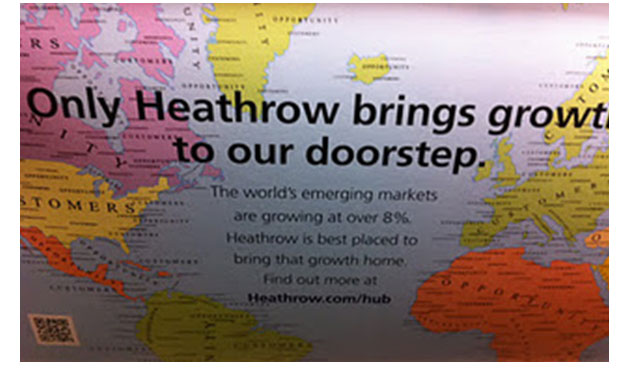A lecture on Neo-colonialism yesterday began with this image…

…a photo of a poster at Heathrow airport which claims that “Only Heathrow brings growth to our doorstep”. The ad shows the world covered with the labels “CUSTOMERS” and “OPPORTUNITY”. An innocent observation on the current status of the global business world? Perhaps, but when considered in relation to colonial legacies, Heathrow’s map, which labels almost all of Africa as one huge opportunity for capitalism, is an uncomfortable caricature of the pernicious neo-colonial relations of power which continue to be at work in international relations.
In a seminar on the same subject, a fellow student flagged up the following advert, which is one in a series from HSBC:

Again, perhaps an innocent image, but when viewed through a postcolonial lens its hard to ignore the way that the advert divides people and practices into binary categories: “trendy” vs. “traditional”. The broader HSBC ad campaign is called “Your point of view” and the message seems to be that understanding different cultures is good for business. It represents what you could call “smart economics” (a phrase which originates in the World Development Report 2012 which you can read about here). On the one hand, it is refreshing to see that a bank is interested in recognising and understanding cultural nuances. On the other is the question of why a bank is interested in this subject, and the answer has to be profit.
As Gayatri Spivak elucidates in The New Subaltern: A Silent Interview,
“Today, the subaltern must be rethought. S/he is no longer cut off from lines of access to the centre. The centre, as represented by the Bretton Woods agencies and the World Trade Organisation, is altogether interested in the rural and indigenous subaltern as a source of trade-related intellectual property or TRIPS…Marxist theory best describes the manner in which such “intellectual property” is made the basis of exploitation in the arenas of biopiracy and human genome engineering” (2000, p. 326).
What Spivak is referring to are the new forms of colonialism which are exercised over people’s bodies, and particularly the bodies of marginal and vulnerable people. These have come to be referred to by the term biocolonialism.
As well as the obvious connection to colonialism, biocolonialism is also linked to the concept of biopolitics, or biopower, developed by Foucault. In Discipline and Punish, Foucault rejects the notion of the power of the state as top-down sovereign power, and instead claims that disciplinary power has emerged. Disciplinary power is productive rather than repressive and, through institutions such as schools and prisons, aims to normalise individuals into efficient modern subjects (Foucault, 1991, p. 221). In The History of Sexuality vol. 1 Foucault develops his study of disciplinary power, extending it to the study of how, at the level of individuals, human populations are normalised beyond the walls of institutions, through biopower. In this way Foucault argues that there has been a transition since the 17th century from politics to biopolitics. The Italian thinker Georgio Agamben has built on Foucault’s work to describe what he sees as ever more extreme expressions of biopolitics, which results in the production of “bare life” – epitomised by the precarious position of human beings in the concentration camp, but experienced by us all in the context of the modern state (Agamben, 1998, p. 6). Biocolonialism thus links together the observation of continuing colonial power relations with an understanding of the ways bodies are disciplined in the context of the modern state, globalisation and capitalism.
The term biocolonialism describes disturbing practices such as: international commercial surrogacy, markets in body parts, the appropriation and patenting of indigenous knowledge by Western corporations (such as the neem tree – read more here), the use of populations and land in the global South for testing potentially harmful pharmaceutical and agricultural products, and the creation of databases of indigenous people’s DNA (also named “The Vampire Project”). These practices sound like they belong to the world of Kazuo Ishiguro’s book (and now film) Never Let Me Go, but unfortunately they are a reality, not a fiction.
The world’s most powerful institutions and corporations are now interested in subaltern people, because they represent a commercial “OPPORTUNITY”, and are interested in their “point of view” because their bodies and cultural practices represent an untapped resource to be exploited. With this in mind, it is hard to view Heathrow’s map or HSBC’s adverts without thinking of the neocolonial exercises of power which continue to play out in the lives and bodies of rural and indigenous populations.
Hannah Butt is a member of the e-IR editorial team.
Bibliography
Agamben, G. (1998). Homo Sacer: Sovereign Power and Bare Life. Trans. Heller-Roazen, D. Stanford, Stanford University Press.
Foucault, M. (1991). Discipline and punish: the birth of the prison. Trans. Sheridan, A. London, Penguin.
Spivak, G. (2000). The New Subaltern: A Silent Interview. In: Chaturvedi, V. ed. Mapping subaltern studies and the postcolonial. London, Verso. pp. 324-340
Further Reading on E-International Relations
- Opinion – The Pope’s Apology for Indigenous Residential Schools
- Call for Papers – Dignity in Movement: Borders, Bodies and Rights
- J’accuse! The Case for Pre-modernism, or, the Rural-urban Divide
- Indigenous Conflict Victims and the Growing Tent City in Bogotá
- Opinion – In Defense of U.S. Education and Cultural Programs
- Democracy in Virulent Times: Symbols and the Future of National Populism